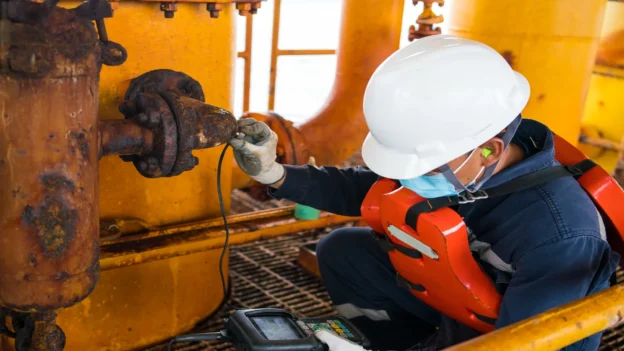As the energy sector undergoes significant transformation, it faces new challenges and opportunities in all segments, from oil and gas to renewables. Maintaining the integrity, safety and sustainability of the energy infrastructure, with a critical focus on corrosion control, is more important than ever. The Association for Materials Protection and Performance (AMPP) is at the forefront, providing the standards, certifications and resources to address these evolving needs, including advanced corrosion protection solutions.
Challenges in the energy sector
The industry faces increasing challenges in maintaining asset integrity, particularly with aging infrastructure and the growing demands of harsh environments. Existing oil and gas transportation systems now need to be upgraded to transport new fuels such as CO₂ and hydrogen, which can introduce new corrosion risks. These developments require updated design and inspection criteria to effectively manage the highly corrosive products now moving through these systems.
Offshore wind farms, hydrogen pipelines and carbon capture projects also present challenges that require innovative corrosion protection strategies. For example, methods developed for offshore oil platforms can be adapted to protect offshore wind power plants, while corrosion control of oil wells can serve as the basis for CO₂ injection projects. AMPP initiatives in carbon capture, utilization and storage (CCUS) and alternative fuel transportation are crucial to guide this transition.

Opportunities for innovation
While the challenges are significant, the shift to new energy sources creates great opportunities for innovation, with advances in corrosion protection contributing directly to the success of renewable energy projects. Preservation strategies used in civil structures, for example, can be adapted for use in solar farms and geothermal plants.
Recent research by AMPP members, including Dr. Gerald Frankel and Dr. Mariano Iannuzzi, estimates that by 2030, between 4.1% and 9.1% of global CO₂ emissions could come from steel production to replace materials lost to corrosion. This highlights the need for sustainable infrastructure design. Life cycle assessment of clean energy projects must consider the performance and reliability of materials to minimize environmental impact. Corrosion mitigation is critical to reduce costs and carbon footprint in large industrial projects.
AMPP’s role in shaping the future
AMPP is committed to addressing these challenges with industry professionals. Our SC 26 Standards Committee focuses on carbon capture, alternative fuels and energy storage technologies such as hydrogen and biofuels.
AMPP Guide 21532, published in 2023, covers material selection and corrosion mitigation for CO₂ transport and injection. It has quickly become one of AMPP’s most popular standards, attracting the attention of both industry and regulators. The committee is now planning a series of documents addressing laboratory testing, failure modes and material selection for CO₂ injection wells and transport. They are also working on similar guidelines for hydrogen transport and corrosion testing for hydrogen.
Experts from more than 30 countries are participating in COP 26, reflecting the global efforts driving the energy transition. Latin America is well represented, with Dr. Leonardo Uller in Rio de Janeiro leading one of AMPP’s hydrogen projects. Dr. Uller should be a familiar name to INSPENET readers.
Beyond technical standards, the association also focuses on workforce development, ensuring that engineers, inspectors and technicians have the latest knowledge to manage corrosion and protect infrastructure. Our certification programs and continuing education initiatives ensure that professionals have the latest knowledge and techniques.
As the energy field reaches this critical point, the association will continue to lead the way, providing the technical guidance needed to ensure safer, more sustainable and efficient energy operations. Through our comprehensive standards, cutting-edge research and commitment to workforce development, AMPP remains dedicated to supporting the industry in delivering cleaner, safer and more reliable energy solutions.
More information at: www.ampp.org
This article was developed by AMPP and published as part of the fourth edition of Inspenet Brief magazine December 2024, dedicated to technical content in the energy and industrial sector.

